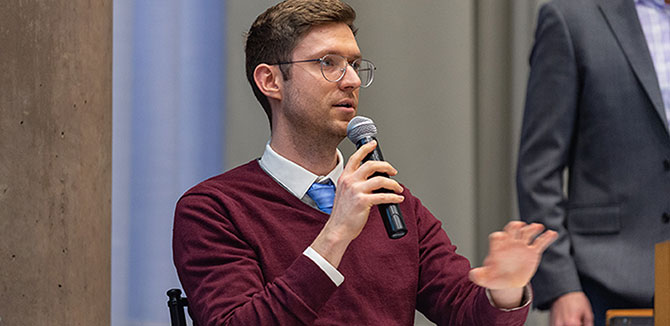From MBP to PhD
Bradley Biggs (MBP '14) talks about his experience in Northwestern Engineering's Master of Biotechnology program (MBP) and his decision to pursue a PhD at Northwestern.
Bradley Biggs majored in chemical engineering at the University of Southern California, but it wasn't until late in his time as an undergraduate that he discovered a passion for biology. He ultimately decided he wanted a career that combined his interests in biology and chemical engineering, but to do that, he felt he needed more experience.
For that, he turned to Northwestern Engineering's Master of Biotechnology program (MBP).
Biggs (MBP '14) used his MBP experience to land a job at a startup out of Massachusetts Institute of Technology (MIT), where he worked for 18 months before returning to Northwestern to pursue his PhD in chemical and biological engineering.
Biggs recently talked about his decision to pursue a PhD, what appealed to him about MBP and what the highlights were from his time in the program.
What was it about MBP that first appealed to you?
It was an opportunity for me as a chemical engineer who had no background in biology to get exposed to biology. It was what I was interested in and I knew that was what I wanted to do, but the opportunities for me were pretty closed because I had no experience and no background. MBP gave me the opportunity to build up some experience.
What were some of your highlights from your time in the program?
Some of the best elements from MBP were the hands-on lab experience with fermentations and some of the purifications — things I ended up doing while I worked at Manus Biosynthesis and I also do as a graduate student. Those pretty directly translated into things I would do later. Beyond that, being able to take some of the basic biology courses was great. There were things I was interested in that I just didn't know at all, so I really enjoyed participating in those classes.
What led to your decision to pursue a PhD?
I always wanted to go into a PhD, and I hope to go into academia eventually. For me, I wanted to go to a program that I thought would help qualify me to get a job, and I felt Northwestern was that place.
What were you doing at Manus Biosynthesis and what are you focused on now in your PhD?
Manus Biosynthesis was a startup company out of MIT that does metabolic engineering. They were at the very early stage of the company and were just moving into a space big enough to fit them. My work was focused on pilot-scale fermentation for different processes that they were trying to make for different products. For my PhD, I'm still focused on metabolic engineering, but I'm trying to expand what I know to do in that area, try new projects and also build up my resume in that field. Ultimately I want to use these experiences to become a tenure-track faculty member at an academic institution.
What advice would you give to a prospective student considering MBP?
Look at what your goal is and think about whether you have a deficiency that would prevent you from reaching that goal. Maybe you're a biology student and you really would love to work in R&D at a biopharma company, but you don't have the technical skills to be able to do that. If you are really interested in that purpose, mission or day-to-day work, this would be a great program for you. Similarly, MBP could be great if you're on the chemical engineering side like me and you really become interested in biology. This program is a good way to gain the experience you need in a short period of time.
MBP provides you with a transition period to get the skills and networking opportunities necessary to get the type of job you want. Also, one of the best aspects of the program is it can be tailored to your unique background.


